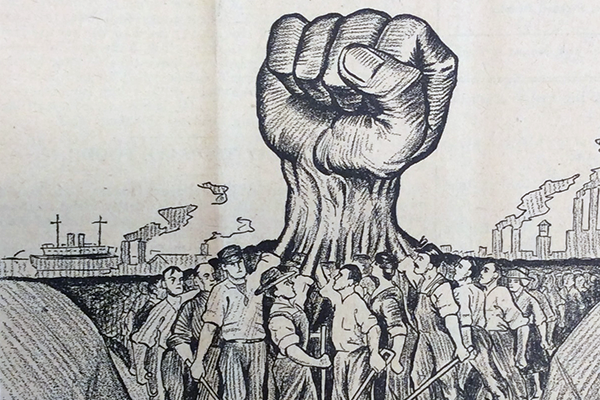
TWILH – The BC Solidarity Coalition
The BC government imposes "restraint" – and the people build Solidarity
[[{“fid”:”866″,”view_mode”:”default”,”fields”:{“format”:”default”,”field_file_image_alt_text[und][0][value]”:”People protesting the BC government in 1983″,”field_file_image_title_text[und][0][value]”:”People from hundreds of unions and groups challenged the BC government in 1983″},”type”:”media”,”link_text”:null,”attributes”:{“alt”:”People protesting the BC government in 1983″,”title”:”People from hundreds of unions and groups challenged the BC government in 1983″,”style”:”font-size: 13.008px; font-weight: normal; line-height: 1.538em; width: 400px; height: 267px; margin: 2px 4px;”,”class”:”media-element file-default”}}]]
Image from IAMAW.ca
In the spring of 1983 British Columbians elected the Social Credit Party, headed by William Bennett. Within months of taking office the “Socreds” introduced 26 pieces of radical right-wing legislation that abolished watchdog-agencies, attacked the role of collective bargaining, especially in the public sector, and cut social services.
The legislation united labour and a wide range of social groups, recipients of social benefits, women, children, students, people with disabilities and a range of ethno-cultural communities all who felt the effects of the attacks. The labour movement lead by the BC Federation of Labour joined with community groups to organize a massive protest movement, known as ‘Solidarity’.
Marches and demonstrations were organized across the province bringing thousands into the streets with calls for a general strike. With many government workers set to be fired on Oct 31st, the BC Government Employees Union (BCGEU) walked of the job on Nov 1st. This sparked solidarity into a series of organized escalating strikes, with the teachers joining in on the second week.
Fearful of an all-out confrontation with the government that could have resulted in attacks on the public service unions, and unsure if the private sector workers would join a general strike, the BC Federation of Labour and Jack Munro, Canadian President of the International Woodworkers of America opened up a dialog with the government. On Sunday Nov 13th an agreement for a truce was reached.
The mass mobilization of “Solidarity” was the start of the fight back against neo-liberal economic policies in Canada. In BC, the fall of 1983 developed a sense of unity between organized workers and the others oppressed by government policies. While there were recriminations in the aftermath of the events that took place leading up to the deal made with the government, there has been a clear understanding since those fall days that for change to happen, solidarity of labour and community groups is needed. It also has inspired solidarity amongst many workers and between many unions in BC, and beyond, to this day.
For more on this event, check out:
Labour Heritage Centre: Read about Solidarity's quick mobilization of people across the political spectrum
Canadian Encyclopedia: Read about what happened when the BC government introduced "restraint"